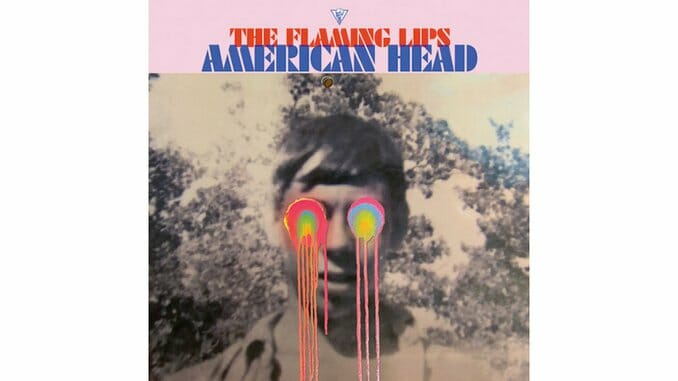The Flaming Lips Revel in Patriotism and Druggy Fantasies on American Head
The psych-rock band flirts with country-inspired psychedelia on a muddled and disappointing 16th album

Since emerging from their guest-studded “fwends” era with 2017’s Oczy Mlody, The Flaming Lips have been on an unusually prolific tip, even by their elevated standards. Neither a global pandemic nor Wayne Coyne’s recent entry into first-time fatherhood seem capable of slowing them down: American Head is the psych-rock group’s third album in four years (fourth if you count the Deap Lips collaboration)—and these are proper studio albums, mind you, not EPs encased in giant gummy fetuses.
What distinguishes American Head from other recent output is how suspiciously normal its central conceit happens to be. It’s not a concept album about evil-natured robots, or a magical severed head. It’s a celebration of the band’s American roots, rich with lyrical references to Coyne’s Oklahoma City upbringing with his troublemaking brothers. “For the first time in our musical life, we began to think of ourselves as AN AMERICAN BAND,’ telling ourselves that it would be our identity for our next creative adventure,” Coyne writes in an explanatory essay. Lord knows what’s more American already than a band of amateurish Oklahoma freaks who worked their way up to convincing a major label to let them release four CDs intended to be played simultaneously, but the Lips have also enjoyed numerous flirtations with British culture. This particular record doesn’t contain any Beatles tributes or winding narration by Mick Jones.
In practice, American Head isn’t such a dramatic departure. The record mostly sloshes around in the kaleidoscope-eyed orchestral pop that has been this band’s hallmark since Yoshimi Battles the Pink Robots. There are moments of genuine melancholy elegance, such as the ambling psychedelia of “Mother, Please Don’t Be Sad,” in which a deceased narrator consoles his own mother as he lays dead, or “Watching the Lightbugs Glow,” a downbeat “Great Gig in the Sky” homage starring Kacey Musgraves’ humming instead of Clare Torry’s wailing.
There is also a more pronounced country influence. Musgraves returns to duet with Coyne on “Flowers of Neptune 6,” a sighing psychedelic gem, as well as on an ominous crime vignette called “God and the Policeman.” (The collaboration makes more sense than you might think, given Musgraves’ pivot towards lightly experimental country-pop on Golden Hour.) Steven Drozd’s harmonies and melodic flourishes are as buoyant as ever, and Coyne’s familial mood (several tracks reference his older brothers’ youthful antics, such as Tommy Coyne crashing his motorcycle) lends the album a sense of unexpected intimacy.
But by track four, a whimsical-by-numbers reverie called “Dinosaurs on the Mountain,” American Head starts to fall off an American cliff. The tempos are slow enough to deflate even Coyne’s considerable charm, and the record’s rootsy, pastoral spin on the Lips’ sound is undermined by the band’s maximalist production ethos. Nearly every song is overstuffed with queasy synth textures and sleek, digitized strings, and Coyne can’t resist warping his vocals in a grab-bag of ugly processors, such as the vocoder croon he uses to serenade his younger self on “Assassins of Youth” or the robotic effect that renders “Brother Eye” dead on arrival. For an album so steeped in nostalgia for the Flaming Lips’ early history, American Head never quite recaptures the feel of three inspired humans playing music together in a sweaty room.
-

-

-

-

-

-

-

-

-

-

-

-

-

-

-

-

-

-

-

-

-

-

-

-

-

-

-

-

-

-

-

-

-

-

-

-

-

-

-

-








































